As you know, we’ve interviewed quite a few different people here on Gaming Reinvented. We’ve interviewed Judge Spear and the Fusion Gameworks team about Mushroom Kingdom Fusion. We’ve talked to Shesez about Boundary Break.
And well, with BlueJackG and Loeder among others, we’ve also interviewed quite a few music remixers too. It’s quite the motley bunch as far as interviewees are concerned!
But this time, we’ve something a bit different. Why?
Because it’s not a fan game developer or YouTube personality! Nope, this time it’s with the developers of an interesting game known as Soul Reaper. So, what is Soul Reaper anyway?
Well, to put it simply…
It’s a top down RPG which mixes elements from Final Fantasy, Diablo, Pokémon and the Legend of Zelda series.
So here’s how it works. You’re a grim reaper called Soul Reaper, and you have to explore a mysterious cave called the Vault in order to collect souls. These souls in turn are held by various enemies (like knife wielding squirrels and psycho fish), and can be used for abilities in battle once you collect them.
Either way, it’s an interesting little game, and one we definitely recommend checking out. But hey, enough of that! Onto the actual interview!

So, let’s off with some personal history now. Who are you? Who are the people working for Power Level Studios?
My name’s Danny Forest, I’m a software engineer/game developer from Canada. I’m currently a nomad, travelling the world while working on our game: Soul Reaper. Power Level Studios is composed of people from USA, Hong Honk and South Africa, now living in Toronto, Canada (with one exception). We are one producer/designer/developer, three 2D artists and one 2D animator.
And how did you get into video games to begin with? What era of gaming was your first?
I was born in 1986, during the NES era. I have a brother who is about 5 years older than me and loves playing RPGs, so I grew up playing The Legend of Zelda, Final Fantasy and Dragon Quest (Dragon Warrior in Canada back then) in my early years. And I have no idea how I did it, but I remember finishing Zelda and Final Fantasy 1 when I was only 4 years old, without speaking a word of English. I’m sure I got some help from my brother, but I like to think I did that by myself!
Any games you really enjoyed, perhaps those which can be considered an influence for your later work?
There are so many! I have always been a big RPG player and have been a great Square Enix follower. When two of my favourite companies merged, Squaresoft and Enix, I was so happy. To me, it meant more better games. I was mostly right I think. I’m very much inspired by all Final Fantasy games before XI. I love Tri-Ace games, especially Star Ocean 2 and Valkyrie Profile. The ancient cave in Lufia II was the original inspiration for Soul Reaper. The Zelda and of Mana series have always inspired me as a developer. I’m also a really big fan of the 2D Castlevania games. And I can’t count how many hours I’ve sunk into Diablo 2. There’s definitely more than that, but you get the idea; I love RPGs!
What about your history of video game development. How did you first get involved in that?
We got our first family computer pretty late; At that time, I was 13 years old. I already knew that I wanted to make games growing up. I searched the best ways to make RPGs at the time and found RPG Maker 1998. That tool was amazing for the time! I was able to make games so fast and learn about game design early on. I was able to make a game inspired by the Suikoden series.
Looking back, it was probably pretty bad, especially with my limited English skills. I then followed with RM2K, Game Maker and BYOND. Game Maker introduced me to conditions and loops and BYOND introduced me to coding. I was about 16 years old at the time I think. I released my first MMORPG on BYOND a few months later. Many people tried it, but it was taken down very quickly. I called it Final Fantasy Arena, and used spritesheets I found of FFIV-FFVI. For some reason, I didn’t understand why it was taken down haha!
It also seems like you’ve worked at a fair few development companies before starting Power Level Studios. How did you get involved at those?
My first paid job in the industry was with XMG Studios in Toronto. It was a 4-month coop term with the university. Before that, I had worked for the Government of Canada and started two companies: one in software development and one in organizing local video game tournaments. XMG hired me because of my entrepreneurship and my previous experience in developing games. I had pretty good grades in software engineering classes too, but I think it didn’t matter as much. I worked on Drag Racer World, which did great until CSR crushed it.
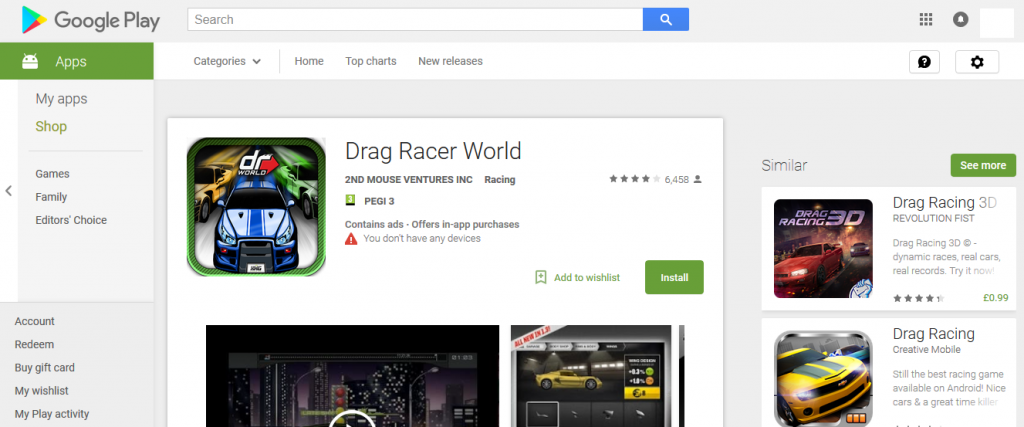
For Massive Damage after, I was pitching a self-improvement gamification company to a Montreal incubator called Year One Labs. Things were going smoothly, but they only had funding for 5 companies. I think mine was 6th in line. Their top company, Massive Damage, were looking for a backend developer and so we joined forces. I built Please Stay Calm’s backend from the ground up and became producer two years later.

For Sauropod Studio, well, one of the founders is a good friend of mine. We met when working at the movie theatre in Gatineau a few years before. He needed a backend engineer and I was looking for change. I also helped with some frontend stuff and artificial intelligence.
Was there any particular reason you chose these companies to work with? Did their game projects grab your interest more than others that other development companies may be working on?
XMG Studio was one of the only video game companies that applied for the program at my university back then. They had created innovative AR games and I thought that was unique and cool. Massive Damage was building the world’s first location-based MMORPG for mobile and I was looking to improve my backend skills so it made sense to me. And I had met the founders before and we got along really well. We were a great team together.
When moving to Sauropod Studio, I had to choose between them, GameHive and Uken. All three projects could not have been more different. I had friends or connections at each of these companies, so that was made easier. I first declined Uken because I don’t think I was a good cultural fit. The company was a little big for me, so my entrepreneurial spirit probably would not have worked there. I then declined GameHive because the commute was too painfully long. So I chose Sauropod Studio. Castle Story was a really cool project, and the backend was built in python, which I had no experience with (major plus for me).

And what inspired you to start your own company?
I had started three companies before Power Level Studios, but it was the first in video game development. For me starting a new company was a no brainer. Being entrepreneur is in my blood; I can’t help it, I need to start stuff!
I started Power Level Studios because I love making RPGs, and the companies I worked for in the past didn’t really have interest for them. Please Stay Calm was a very light RPG. I wanted to build another great old-school-style RPG like Lufia II and Final Fantasy on SNES, but for newer generations of consoles.
How about the name of it? Did Power Level Studios just come from RPGs in general? What was the thought process here?
Yeah, it pretty much comes from my love of RPGs. It’s a well-known term for RPG players, so I thought it would be easy for potential fans to remember the name. Not necessarily the best for SEO though haha!
I basically searched keywords/keyphrases from RPGs and picked the one I thought would sound the best and be the most unique and recognizable.
Rogue Sharks Arcade seemed to be your first game, and it was pretty damn successful. Did you imagine it’d have 3 million+ players?
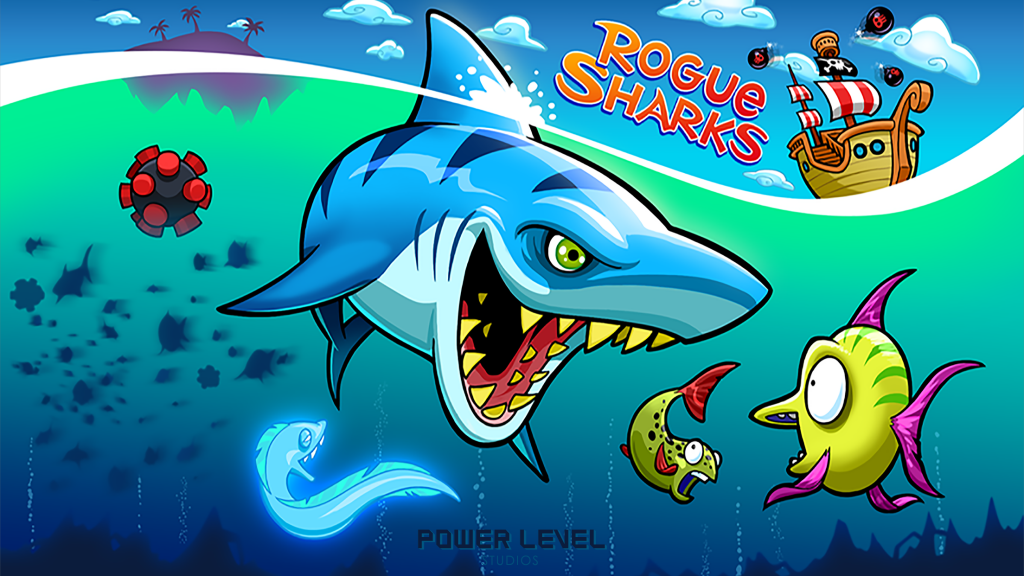
Haha, this one’s a good story I think. Rogue Sharks Arcade was some kind of “accident”, both the game itself and its “success”.
I started working on Soul Reaper back in September 2013 and came to the realization that the game was way too ambitious for a first game. I would need money to hire artists and more, but didn’t have the money. So I thought making a simple mobile game, similar to the classic gravity-based helicopter web game, would be my way out. For some reason, Sharks was the first theme that came to mind. I thought Rogue Sharks would take one month to build. I had limited Unity experience back then, but that’s not why it took much longer. It took about a year to build.
The game just wasn’t fun enough by my standards, so I re-did it a few times with different mechanics. I released Rogue Sharks Arcade two months in, since the game had enough content to be a full-game loop.
I released it on the web on Kongregate and was hoping to get feedback so I could improve it for mobile after. Money was not the target here. About 200 people played it on Kongregate and had a score of 3/5, confirming my assumptions: it’s not a very good game.
But here’s the interesting part: how did I get from 200 players to 3M+? The short answer: it was stolen and put on MANY other websites around the world. You see, I was too dumb to protect it, and I didn’t even put my company logo or the game title in the game, so people just rebranded it and claimed it as their own. It got featured on lots of Chinese and Russian websites. There was no English text in the whole game. Everything was icon-based, so it was accessible in any language.
BUT, because of that incident, I got exactly what I wanted: feedback. With 200 players, I got close to 0 feedback, with 3M+, there were plenty of players to give feedback. I had to track websites down and translate feedback back to English, but still, there was lots of feedback. But that’s not all, I was tracking everything in the game using Game Analytics. I knew exactly how people were playing, so I knew how to improve the game for mobile.
But then at that point I was travelling around the world with my wife for about a year, so I didn’t have much time to make the mobile version. But I did it anyway. I stopped Chiang Mai, Thailand, to work on it for one full month and finished it. So Rogue Sharks for mobile exists, and is a much better game than Rogue Sharks Arcade on the web. I never released it though, because it’s still bad in my opinion. We were in 2016 then and there’s millions of games in the App Stores. A lot of them are great and have a much bigger budget than we had at the time. Unless I found a good partner to release the game, I figured there was no point releasing a game no one would discover and play.
Plus, we’re Power Level Studios, we want to make great RPGs, not game genres we know nothing about.
So yeah, the game was “successful” for what we tried to achieve, but definitely no commercial success. And yeah 3M+ was definitely not expected!
Onto the game itself now. Why Soul Reaper? There seems to be quite a bit of competition on the name front…
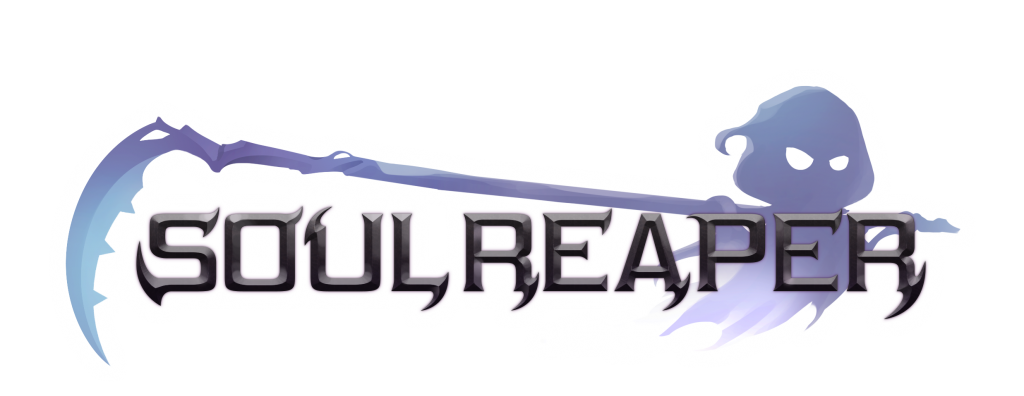
If you play the game, you can see that the title Soul Reaper makes so much sense: You’re the grim reaper stealing souls! It’s also short enough and sounds pretty good. The word “soul” can be confused by “sole” however, which has been a problem in the past. Another problem was the release of Diablo III’s expansion: Reaper of Souls. Hopefully it will be old enough by the time we release the game in Q4 2018…
The character in the game was a secondary character from another game I had started work on for Xbox 360. Back then, he was the Gate Keeper. His role was to protect gates to other dimensions. Since the game was never released, and he was one of my personal favourite characters, I decided to make a game around him. So the first name was: The Gate Keeper. But his name didn’t make any sense in the context of soul stealing. We reused the fact that he’s an undead grim reaper and found a title that matches his “profession”.
According to your site, it’s a roguelike RPG with monster catching mechanics. Why did you choose to make this kind of game?
Funny part is: I didn’t. The original idea was to create a game around the ancient cave idea from Lufia II on SNES (which is kind of Roguelike), but for newer generations of consoles. But I was also replaying Castlevania Dawn of Sorrow and Diablo 3 around the same time and thought to myself: wouldn’t it be cool to play in the ancient cave, use monster’s abilities and collect diablo-style loot, all in a single game? To this day, I still can’t find a game combining all these concepts together.

The original idea was for a mobile game, and had no inspiration from Zelda, Final Fantasy and Pokémon. It was actually more of a Dungelot meets Greedy Cave game.
But then in October 2015, I applied for a Canadian grant to flesh out the design of the game and experiment with different art styles. To flesh out the design, we decided to try different versions of our core game concepts like exploration, combat and souls. On the list of things to try was Zelda 1-style exploration and Pokémon catch/summon mechanic. We also tried a few versions of our FF-style combat, and even on map-combat, more similar to typical rogue likes.
When putting the prototype together, some of the best implementations included the features mentioned above.
It also seems to have a rather interesting art style. What’s the story behind that? How did you come up with the art direction for this title?
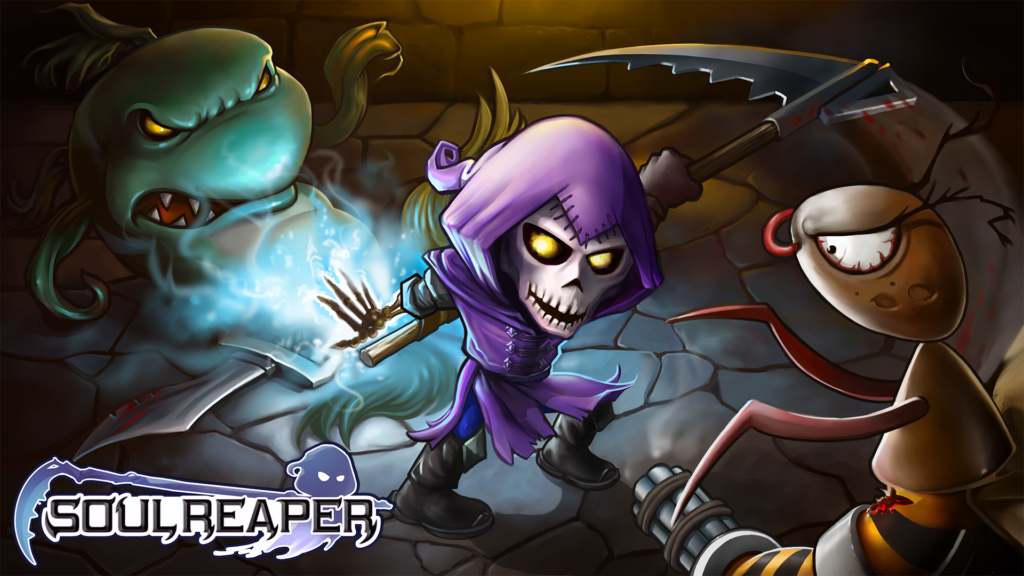
Before applying for the grant, I hired an artist on Upwork.com to illustrate my game idea. I was pretty excited about the results and showed it to one of my advisors, and he basically said that it was shit (censor?). Not that the art was necessarily bad (it was quite good), but that it was uninspired and not unique enough. He was right.
So when applying for the grant, finding the right style for Soul Reaper was one of our top concern.
During that process, we experimented with about 6 different styles and tested it with our advisors and internal networks. The votes pretty much all went to the same style, the one you see now. And I think the reason it works well is because of the cool Spine animations we put in the game. It may not be the most unique or inspired style, but we think it works really well for the game and gives a good sense of what it is about.
The development team is also fully remote. What was the logic behind this? Do you think remote teams work better for game development?
Remote teams probably don’t work better for game development, but it certainly has a few perks. One is: no painfully long commute for anyone, meaning you can get top talent if you’re far away from where the talent is.
Another is: you can live where the cost of living is lower and the weather is better. In fact, I’ll be in Cambodia and Thailand for the next 3 months. That means I can spend more money to pay for other talent. It’s also great for work-life balance. Our animator needs to be home regularly for personal reasons and remote work is a blessing to him.
There are pitfalls too however. Collaboration on features between designers and programmers is certainly harder. Slack and Trello help, but there’s nothing like in-person collaboration for that. In Power Level Studios’ case, I’m currently handling the design and programming, so I only need to talk to myself haha. I do ask for advice all the time, but ultimately, it’s all down to me. I’ve debated in past about hiring designers and programmers, but I don’t think I’d save much time considering communication issues.
So there’s definitely a lot of pressure on my side to deliver, especially that I’m also managing public relations, social media, and all the different aspects of the development of Soul Reaper.
Ultimately, the logic was that we save money on office rental and improve our quality of life.
So if you die you apparently get kicked out of the vault while keeping items. What inspired that? It seems a bit different to the typical Roguelike permadeath setup…
That’s why we don’t really like to qualify it as a Roguelike, but rather a Roguelite, more like Rogue Legacy in a way. In Rogue Legacy, you keep “ALL” the gold you collect during your run. You have to spend it before going back, but still, you retain it.
In Lufia II, our original inspiration, you only get to keep the blue chest items. So that’s what we played around with at first. The Greedy Cave also has a similar mechanic, but you can find a gold shrine to imbue your loot and keep them when going out. Our biggest problem with that is that when you play the ancient cave in Lufia II and don’t get a single blue chest in your 1-hour run, it really sucks. You feel like the game is cheating you. I don’t want to cheat our players. Instead, in Soul Reaper, you have limited inventory size when exploring. Once full, you have to choose which loot you want to keep. You can always store it outside the Vault and keep it after, but in the Vault, the choice is yours.
As for souls, that’s the main collection mechanic of the game. Can you imagine losing your souls in Castlevania Dawn of Sorrow or your Pokémons in any Pokémon game when you die? It’s frustrating! You can’t reap’em all if you can’t keep’em!
Plus, you never actually die in Soul Reaper. When your health reaches 0 in combat, you take a portal to get back outside, back to full health.
You do lose stuff though: when going outside the Vault, you always start back at player level 1, losing all the stat points you assigned. The stat point system works almost exactly like Diablo 2. Strength increases physical damage and resistance, agility increases your turn order speed, intelligence increases soul damage, elemental resistance and max spirit (MP) and vitality increases max health. When you’re not geared enough, these make a big difference early on.
Okay, the souls thing now. Seems like you get them as abilities to use in battle after defeating enemies. Were you inspired by Castlevania or Mega Man when you came up with this concept?
Precisely. I’m a big fan of these two-game series and always felt like such a mechanic could work great for a 2D turn-based RPG.
A new system we’re introducing in the next version of the prototype is the “Unreap” system: where you can unreap/summon a monster’s soul you’ve reaped before. The unreaped monster gets added to the timeline and performs actions on its turn. There’s still a lot of design considerations to take into account for that feature, but ultimately it will play similar to Pokémon.
So souls are not just for stat boosts and abilities anymore.
And those enemies you seem to kill for them are a tad odd. So where did those ideas come from? Fire breathing sharks and knife wielding squirrels? That’s unusual even for an RPG…
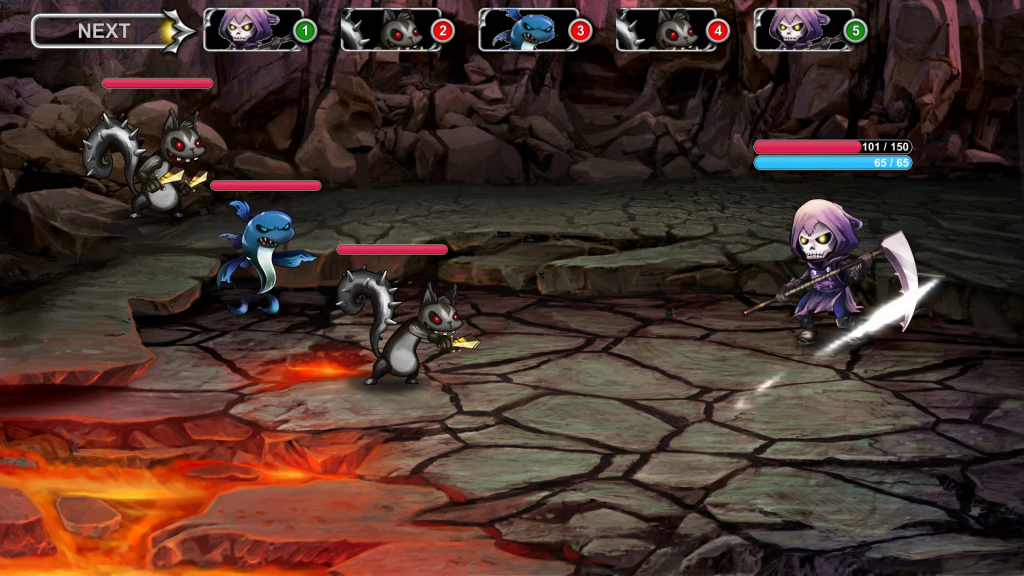
I think it all started with the Stabby Squirrel. I really like squirrels personally. They’re so athletic and move gracefully. I always dreamed of making a Ratchet & Clank style game where the main protagonist is a squirrel. It would behave similarly to Ratchet meets Tails from Sonic.
But then how does a squirrel hurt you? It punches you? Bites you? Swipes its tail at you? Doesn’t sound very dangerous! I wanted every monster to feel like it was an actual threat to Soul Reaper. Plus, in a loot-based game, why wouldn’t monsters pick up epic loot too? So we gave weapons to most of them. The Flame Bee ended up being the actual first monster, inspired by the bee in Donkey Kong Country.
Also, since the game revolves a lot around “monster collection”, we didn’t want to be just another Pokémon clone either, so that’s one way for us to be different too. Some Dragon Quest monsters also have weapons and they look cool in my opinion.
Is there a reason for many of the enemies to be weapon wielding psycho animals? How does that factor into the story?
Most of that was answered above. So far, there’s no ties between that and the story. Could be interesting though.
Heck, what is the general gist of the story here? Is there something more going on than just you entering this cave and looking to get as many souls as possible?
Haha yeah there is. I’ll try not to reveal too much yet.
Ultimately, as Soul Reaper reaches further into the vault, he’ll uncover the mysteries of the pact he made with the devil and understand the mechanics behind the existence of the Vault and his very own portal leading out. He’ll encounter familiar faces and come face-to-face with a very unexpected “foe”.
So overall, the tone of the game is not very serious, but the underlying story really is. And we like to think that the main twist will be very unexpected.
It’s definitely one aspect of the game we haven’t spent enough time on though, focusing instead on strong gameplay mechanics. There’s high chances that we’ll get a writer to make the story as interesting as possible.
Bit of music stuff now. Who composed the soundtrack? What was their thought process behind it?
The current music we have in the game is placeholder music. We will hire a composer when we get another round of funding. We did find music that we like and we think fits the theme, especially the combat, outside the vault and combat victory. So, we think we can make original adaptations of those for the final version.
We’re slowly reaching out to composers to try to find the right match for when we’re ready.
Something a lot of roguelikes (and indie games in general) seem to be known for is difficulty. So how hard is Soul Reaper going to be? Does it have super tough bonus bosses or anything?
Regular mob combat is not going to be very challenging. The biggest challenge will be on resource management (health and spirit), as well as preparing properly for your Vault run. When going into the lava cave section for example, it makes more sense to equip fire resistance. But there’s also soul gem selection and combos. Do you equip the Bubbly Shark soul, causing water damage, or the Saint Squirrel, allowing you to heal during combat?
Plus you’ll be able to avoid fighting altogether too, which is also a valid strategy for surviving. Stacking buffs/debuffs and turn-order changing loot and souls are also strategies you have to prepare before going into combat. So when well prepared, combat shouldn’t be too hard.
BUT, you can make it harder too if you prefer it that way. Every run can be customized before going in, similar to Disgaea 5’s cheat shop or Diablo 3’s difficulty selection. The progression will be more similar to Disgaea in the sense that if you want it to be hard, it can be. If you want to grind, you can also do that too, making the game a little easier.
As most RPGs, boss battles will require even better preparation and strategy. The first boss battle introduces enemies that can heal the boss, but they also throw fire balls that apply a burn effect, dealing damage over time. Applied on yourself, that means you take damage every turn, but when applied on the boss, that means it regains health every turn. Taking out these enemies first is likely a good strategy, so is having tons of fire protection and water damage bonus. Basically, every boss battle should feel different and introduce mechanics not seen in previous fights.
Either way, onto a few marketing questions next. Like, how did you get featured on Square Enix Collective?
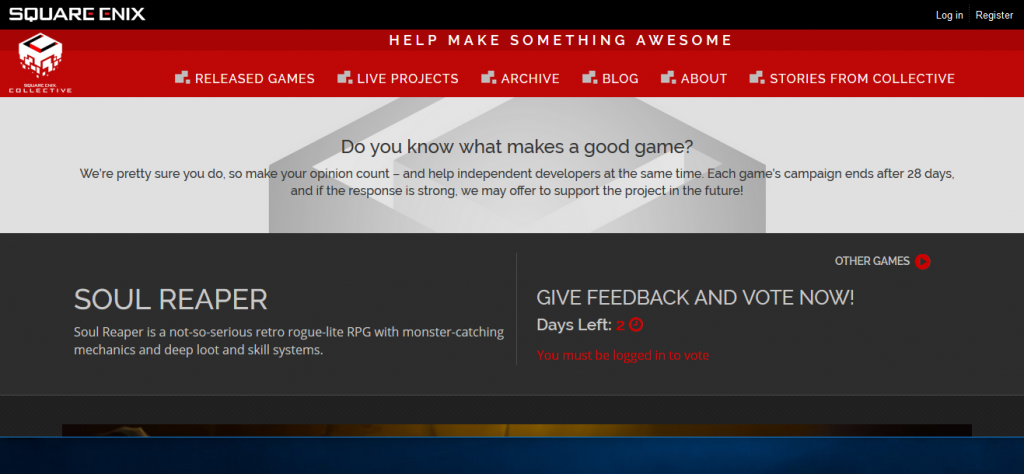
We simply applied and got featured. I think that’s all really. We had to no social presence back then. We spent a lot of time to create our first gameplay teaser for them, which was interesting enough, though not exactly how we wanted it to be because of time constraints. Plus, we had a fully playable prototype built already, so they knew all the screenshots and clips were from real gameplay, making it feel like it was ready enough to show.
We did ask them a few questions before applying too, so maybe that first contact helped get us noticed? Plus, I had worked for Massive Damage before, one of their first game on their platform, which did really well.
Said page also mentions it’ll be on PS4, PC, ‘Nintendo’ and Mac. What Nintendo platform are you planning to release it on? Nintendo Switch or 3DS?
We can’t specify it on that page. We think Soul Reaper would be great on Nintendo Switch. I also carry a 3DS, which I really like too. Getting featured on the Switch would have a greater impact than on the 3DS, so we’re aiming for that one currently.
And how come no release on Xbox One?
Maybe down the road, but we don’t own one currently one and don’t have any good contacts at Microsoft for a potential feature.
Still, let’s move onto marketing stuff. What have you been doing to market this game so far?
Not much yet actually. We started to get involved in forums, reddit, medium, gamejolt, itch.io and social media, posting at least once a day and interacting with other game developers. The Square Enix Collective feature also brought a few potential players, as well as a message from the Kickstarter team to potentially promote the game when we’re ready.
Considering the game won’t be released until Q4 2018, that’s actually quite early to do that. Some think it’s too early and can hurt, but I think getting exposure early on is one key to success.
Have you gotten any coverage from the gaming press yet? Because I haven’t seen much, but maybe I’m looking in the wrong places here…
You’re not looking at the wrong places, we haven’t reached out yet. We’ve started researching contacts and will start reaching out when there’s an actual story worth their time, which is likely to be during Q1 2018.
What’s the general reception been like for the demo you released? Has anyone reviewed it yet?
There’s no actual review yet, but I don’t expect it anyway. It’s not really a demo, it’s a prototype. It’s just a core loop of the game, with very limited content and polish.
We’re currently at 76% on Square Enix Collective, and I’m not sure what that actually means. Maybe the 24% who said “no” just don’t like that type of game? It’s a niche game after all. There’s only 3 comments also.
So yeah, so far not much in terms of feedback. We scrape everything we can from the analytics we gather. But since there’s almost no content, players don’t start many sessions. It’s very hard to get people to give you honest feedback on your prototype. Thankfully my internal network is active enough and is honest. Some of the best ideas that made it in the game was while discussing the game with other people.
Outside of marketing, you also seem to be avoiding common means of monetisation like Patreon and Kickstarter. Was that a deliberate choice?
We filmed a Kickstarter video. We also designed the rewards and stretch goals. Additionally, we also have contacts at Kickstarter to promote the game. We initially expected to release our campaign around August 15th, but decided not too after talking to other developers.
To increase our chances of success, we decided to increase our social influence first, but also be closer to the release of the game. People won’t back a project that’s so far from release. It’s too risky for them. Plus, people won’t know about it since our social influence is too small at the moment. Kickstarter does help with discovery, but you gotta do your homework too.
So we postponed it until later next year.
We didn’t know about Patreon. We’ll look it up. Looks interesting.
Okay, so let’s assume the game will do well. Is this a series you plan to create sequels for?
Story-wise and gameplay-wise, it could work. I don’t see a reason not to.
If so, where would you take them, assuming you had the time and resources?
It would be nice for a sequel to have a world-map and many different “dungeons”, more similar to old-school Final Fantasy games. In Soul Reaper 1, we’re trying our best to make the Vault feel fresh every time, but I like the grandiose aspect of world travel, being a world traveller myself.
Soul Reaper 1 is also lacking “social interactions”. There’s not many NPCs in the game. Hopefully people won’t find it too “lonely”. I like the idea of NPCs for a sequel, it’s just a little costlier if you want to do it right. Like fresh dialogues, instead of always repeating the same thing.
We also have some ideas on how to make it multiplayer, but that adds a lot more complexity.
Finally, what other projects have you considered for the future? Any other interesting games you might be planning to work on?
I’m not thinking that far ahead; there’s still too much to do on Soul Reaper, so I should focus on that. I’ve always wanted to make a Castlevania-type game, but with Bloodstained coming and Sundered just released, it might be a little hard to compete.
And that concludes our interview. As for whether it’s hard to compete with a Castlevania spiritual successor…
Well, we wonder how popular Castlevania spiritual successors will be when this game is done and dusted. Will Bloodstained be a major success? Will other people be following in its footsteps?
Honestly, it’s quite hard to tell at this point. After all, look at Yooka-Laylee and Mighty No 9. They looked like they were doing everything right, and felt like they could have revolutionised whole genres when they were new.
But then thanks to their lacking execution and poor game design, it turned out they went and gone without making much of a blip on the radar at all.
So perhaps Soul Reaper’s sequel could enter an easier market than its developers imagined. Or maybe not. It’s hard to tell really.
Either way though, we’d like to thank Power Level Studios for the amazing answers they provided for our interview, and advise that anyone interested in the game check them out right now. You can do that by going to their official site here, checking out their Twitter, Instagram or Facebook pages here or by subscribing to their channel on YouTube as expected.
So what did you think of the interview? Did you find it an interesting read? Does Soul Reaper look like the kind of game you may be checking out some time in the future?
Post your thoughts on the matter (and everything else related to the game) in the comments section below or on social media today!